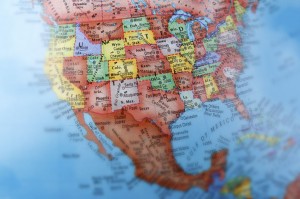“Nones” Still Rise, but the US is Far from Secular Some Takeaways from the Latest Pew Religious Landscape Study

In case you had any lingering doubts, the recently released 2014 Pew Religious Landscape Study has found that “the rise of the nones” is not a fluke but a continuing trend in the US. Twenty-three percent of adults describe themselves as religiously unaffiliated, and those who identify as religious “nones” are becoming increasingly skeptical of the existence of a god.
These results sound like good news for the humanist community. There are more people who are living good, moral lives without putting their faith in gods. As the number of nonreligious voters grows, especially within the Democratic Party, there may be less god-talk among politicians and the stigma surrounding atheists running for office will hopefully dissipate. The study also found that Americans are slightly more likely to emphasize religious institutions’ ability to build community and help the poor over their ability to provide moral guidance. Though 75 percent of Americans still see religious institutions as protecting and strengthening morality in society, that number drops to 54 percent in those who identify as religious “nones.” The Associated Press also noted that the study reveals that nearly every religious group in the country is more accepting of same-sex relationships, though homophobia is still hardly a thing of the past. Still, the trends continue to show that our society is moving toward increasing secularism and tolerance.
Pew also found that an increasing number of Americans are turning to a more personal, private spirituality, as opposed to preferring institutionalized religion. Six in ten adults report feeling “a deep sense of spiritual peace and wellbeing,” and 46 percent of Americans say they have felt “a deep sense of wonder” about the universe. Though these Americans are perhaps using religious language to describe their experiences, this does not mean that these individuals are religious. Some humanists still employ “spiritual” practices, such as yoga and meditation, to relieve stress, and plenty of humanists frequently feel in awe at the vast grandeur of our universe. Such emotions are certainly not limited to the religious individuals’ experiences, and perhaps many “nones” are realizing that meaning comes from the beauty of science, reason, and the beauty of the cosmos.
However, the Pew study also reveals that Americans who are still religious are perhaps becoming a bit more fervent in their faith, or at least maintaining their present level of religiosity. More religious Americans report that they read scripture regularly and participate in small religious groups. The number of religious Americans who report praying regularly has also held steady. These findings seem to suggest that the culture wars aren’t over yet. Even as the number of secular Americans continues to grow, the religious right will likely continue its crusade to infect our politics with faith and blur what should be a clear line between the church and the state.
If humanists really want to ensure that our politicians respect Jefferson’s Wall, we need to make our voices heard in politics. Even though “the rise of the nones” is a trend that both political parties can no longer ignore, secular Americans are not mobilized as a voting bloc in the same way that evangelical Christians are. Organizations such as the Center for Freethought Equality, the Freethought Equality Fund PAC, and the Secular Coalition for America are all making significant strides in communicating the concerns of humanist, atheist, and other secular Americans to elected officials. But there is still more that the humanist community can do to hold our leaders accountable on the issues that we care about. We need to make sure that we get out and vote as well as email and call our representatives. The trends may seem to be in our favor, but that doesn’t mean that there still isn’t work to do to ensure that our First Amendment rights and civil liberties are respected and upheld.
